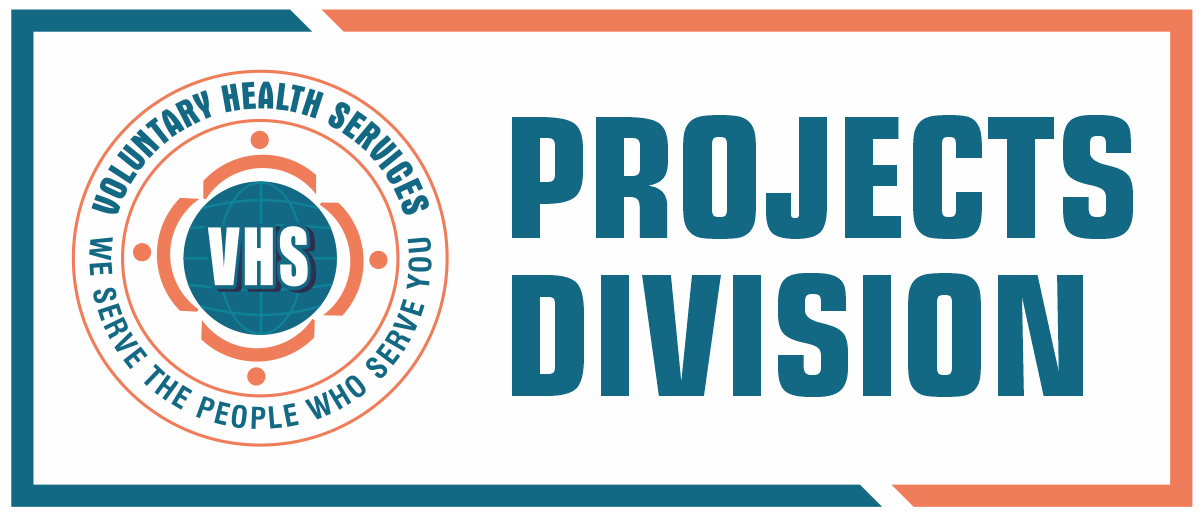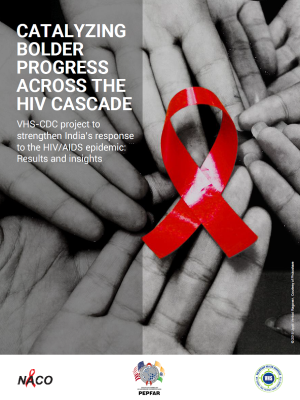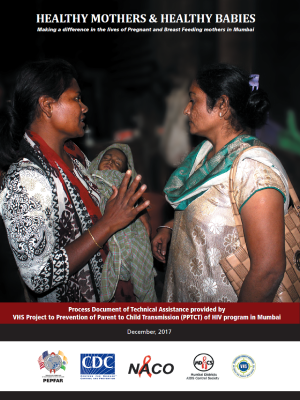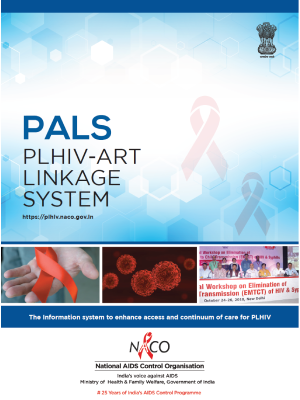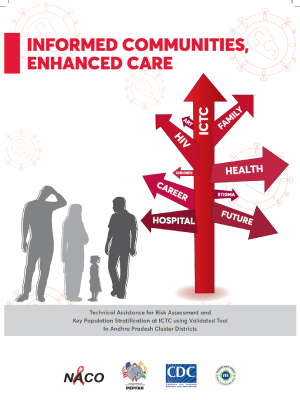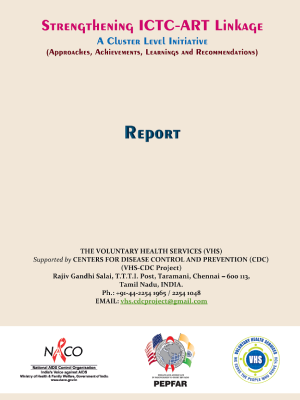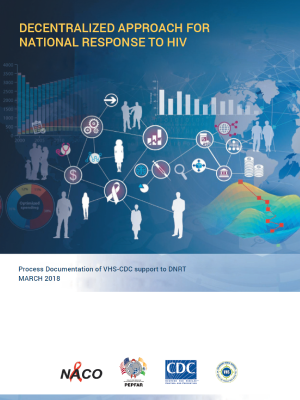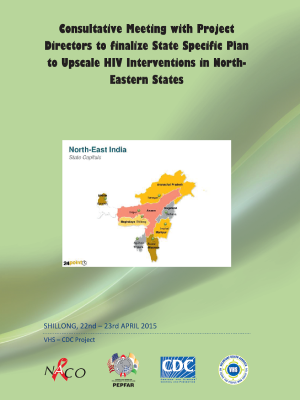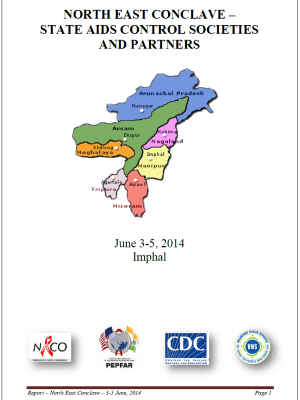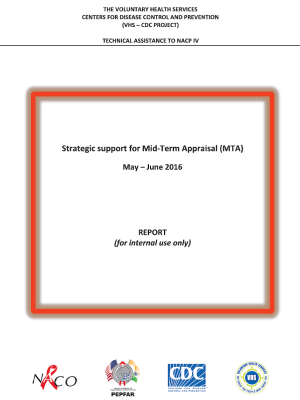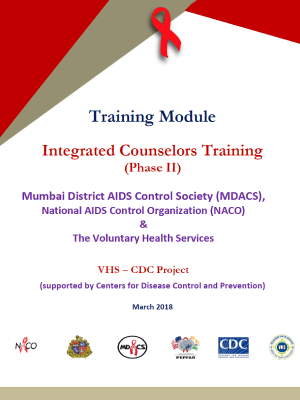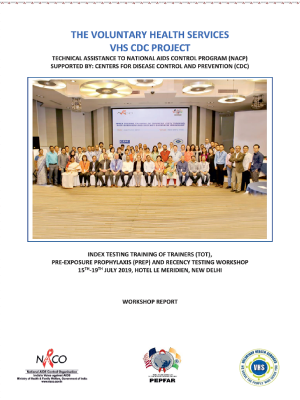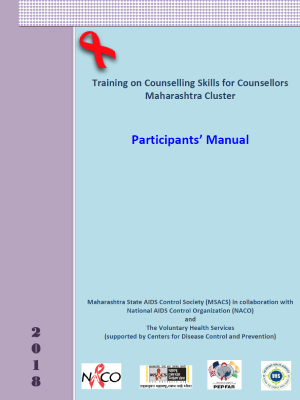Background
The Voluntary Health Services – Centers for Disease Control and Prevention, (VHS-CDC) Project, “TA to NACP-IV’, is providing technical support to the National AIDS Control Organization (NACO) in carrying out national level reviews and policy revisions on prevention, care & treatment and strategic information programmes. In line with the revised PEPFAR strategy, apart from the national level activities, the project has adopted the pivot strategy focusing its efforts on the high HIV burden cluster districts of Andhra Pradesh (AP) and Maharashtra (MH).
VHS-CDC project has undertaken strategic efforts and carried out a series of innovative activities in coordination with various stakeholders at the cluster and national levels.
Goal is to strengthen strategic planning, decision making, national level reviews and policy revisions of prevention, care and treatment programs including cross cutting areas of capacity building, integration, planning and financial systems.
Project supports strategies to maximize resource utilization by addressing gaps identified during program reviews and scaling up high impact practices.
Project strengthens national level activities of NACO and intensely functions at cluster level, in line with revised PEPFAR approach of pivoting to six high burden cluster districts in Andhra Pradesh (East Godavari, Guntur, Krishna) and Maharashtra (Mumbai, Pune, Thane).
Focus Areas
- Profiling risk of clients at Integrated Counselling and Testing Centres (ICTCs), classifying clients and linking clients (including key populations) to HIV services.
- Strengthening mechanisms to ensure all HIV positive clients (including key populations) are linked to ART centre and minimize linkage loss.
- Demonstrating models for Key Population friendly ICTC.
- Supporting the implementation of integrated PLHIV-ART Linkage System (PALS) for improved tracking of PLHIV cases and trends and demonstrating linkage across the prevention to treatment and care cascade.
- Building human capacity to enhance counselling skills of ICTC Counsellors and strengthening linkages to treatment.
- Strengthening Partner Tracing and Testing program.
- Strengthening Prevention of Parent to Child Transmission of HIV (PPTCT) program to address gaps found in HIV testing of pregnant women, coverage of Early Infant Diagnosis (EID) and initiation of Anti Retro-viral Therapy (ART) among HIV positive pregnant women.
- Capacity enhancement and mentoring of 188 District AIDS Prevention and Control Units (DAPCU) across India through DAPCU National Resource Team (DNRT) leading to improved program efficiencies, enhanced quality of data for decision making and strengthened mechanisms for cross referrals between diagnosis and treatment facilities.
- Strengthening the Strategic Information Management Unit, basic services and care and treatment program.
- Conducting quality review of Opioid Substitution Therapy centers functioning at government health facilities.
PLHIV – ART Linkage System (PALS)
- Developed PALS, a web based online – individual tracking system to improve tracking of clients across the prevention-to-care continuum cascade. VHS-CDC project has developed a module for uploading data offline.
- VHS-CDC project in collaboration with APSACS, MSACS and MDACS has conducted the training program on PALS for ICTC counsellors, data managers and DAPCU personnel.
- VHS-CDC project in coordination with NACO has documented the experiences of implementing PALS in the form of process documentation supported with best practices, abstracts and case studies.
- PALS successfully completed the security audit and earned a security certificate. PALS is helping the HIV program to track and manage cases across geographies, enabling data management by eliminating duplication and redundancies, facilitating to identify and track Loss to follow up (LFU) cases and ensuring data management for the PPTCT and Early Infant Diagnosis cohort.
Activities – cluster level
The project is working closely with MSACS, MDACS and APSACS and other key stakeholders in piloting the above innovations. The project personnel both at the project office and at the cluster level are coordinating with respective SACS, undertaking mentoring visits, participating in review meetings and providing strategic technical support.
Key Achievements
- Collaborated with NACO, SACS and provided Technical Assistance.
- Implemented in the cluster districts models for fast-tracking 90-90-90 in Andhra Pradesh and Maharashtra States.
- Strategic Information Management Unit (SIMU), Basic Services and Care & Treatment programme of NACO: VHS-CDC project supports positions of technical consultants in NACO as part of its strategic support to NACO.
- TA for organizing National Workshop for finalizing Risk Assessment Tool: VHS-CDC project has developed risk assessment tool for administering to clients at ICTCs. The tool was presented at the national workshop organized by NACO in collaboration with VHS-CDC project. A sub-committee was constituted by NACO, which reviewed and finalized the tool for implementation.
- Extended Technical Assistance (TA) to NACO in developing plans and systems for conducting Joint Implementation Review meeting for NACP IV by involving key stakeholders including donors in selected states.
- North East Strategy: Supported and facilitated development of strategic plan specific to North East region for scaling-up NACP in eight North Eastern states. Carried out systematic reviews of North East HIV/AIDS program, established priorities, identified gaps and documented challenges to tailor and strengthen response to HIV/AIDS in North East region. Conducted four multi-stakeholder North East conclaves with specific reference to People Who Inject Drugs (PWID) including Female Injecting Drug Users (FIDU) and supported state-level consultations.
- DAPCU National Resource Team: DAPCU Monthly Report developed as a monitoring tool to capture the activities of DAPCU, analyze progress, track key indicators and provide feedback to DAPCU team. An innovative monthly score card was designed on key indicators to track performance and monitor effectiveness of DAPCUs. The DAPCU blog served as a knowledge sharing platform for facilitating exchange of best practices, lessons and experiences among DAPCU teams across India. DNRT offered strategic support to DAPCU Nodal Officers and key SACS officials for systematic conduct of DAPCU review meetings, addressing data quality issues and utilizing data for decision making.
-
Geared up in strengthening intensively site-level interventions and innovations on:
- Risk profiling and classification of clients at ICTC using risk assessment tool.
- Identification of index client and Index Based Testing.
- Strengthening ICTC-ART linkages.
- Supporting implementation of PLHIV-ART Linkage System (PALS).
- Supporting PALS-IMS (Inventory Management System) integration for tracking clients across the HIV cascade.
- Contributed for fast-tracking 90-90-90 targets and hard to reach and invisible population.
- Demonstrated innovative models/ scalable models for improved response.
- Developed PALS software and capacitated reporting units for management of HIV.
- Improved management and monitoring of DAPCUs for strong multi-level, multi-sectoral response to HIV epidemic.
- Developed an innovative mobile-based application for PLHIV for improving treatment literacy.
- Supported development of strategies to improve HIV-TB coordination for early detection in select northern states.
- Provided technical assistance to NACO for conducting review of Government Opioid Substitution Therapy (OST) centres.
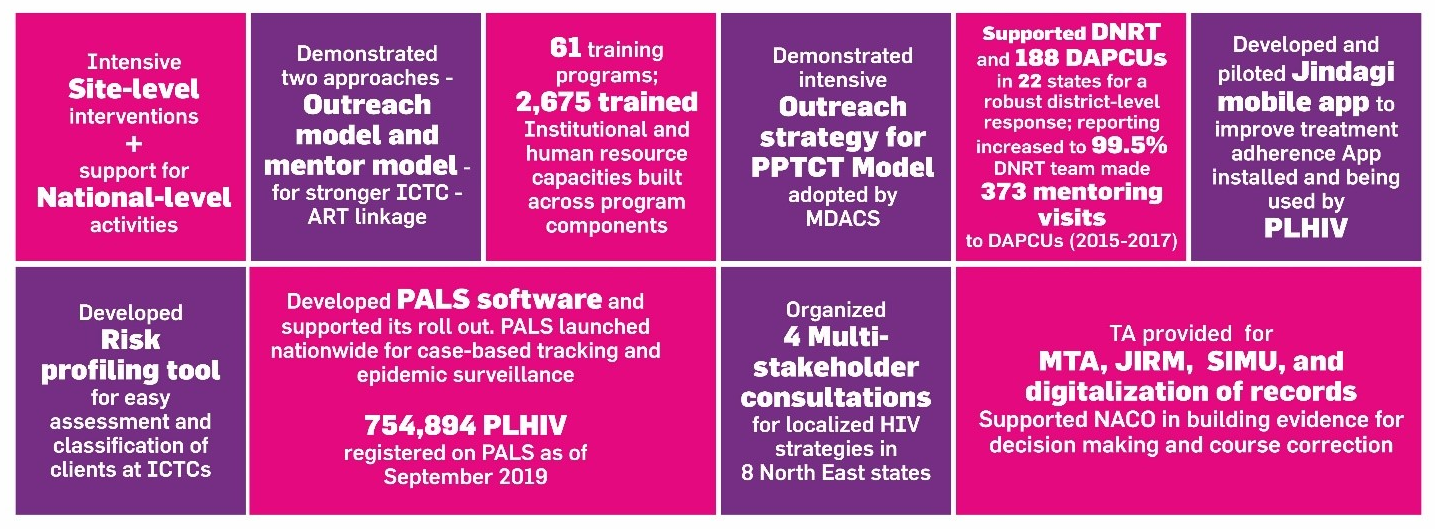
Contact Us
Director - Projects
CHARTERED - Projects Division
The Voluntary Health Services (VHS)
Rajiv Gandhi Salai, TTTI Post,
Taramani, Chennai – 600 113.
Email ID: williams@vhsprojects.org
For additional information on VHS Projects Division - CHARTERED, its objectives, partnerships, key activities, projects managed, overall achievements, key publications, and publications for downloading, please visit or click Here
